‘Sidelined and forgotten’
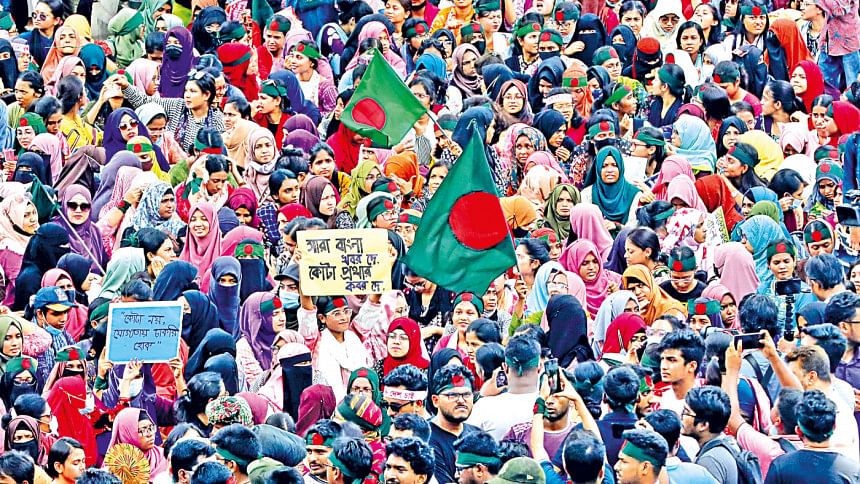
On August 5, 17-year-old Nafisa Hossen Marwa, an HSC examinee from Sahajuddin Sarkar Model Higher Secondary School in Tongi, was among thousands marching towards Gono Bhaban, demanding change.
A regular at the quota reform protests, she had been sneaking out of her room, defying her family's disapproval, to stand on the front lines.
But on that day, as the march reached Pakija near the Dhaka-Aricha Highway in Savar, Nafisa was struck down by police bullets.

Her HSC results, published months after her death, showed she had earned a GPA of 4.25.
On the same day, 16-year-old Rita Akhter, an HSC student from Duaripara Government College, was fatally shot in the head.
Meanwhile, 22-year-old Meherun Nessa Tanha, had spent the whole afternoon of August 5 celebrating the fall of then prime minister Sheikh Hasina.
She was relaxing in her home at night, when a bullet, from Kafrul Police Station, pierced through her window and hit her. She died.
At least seven women were killed in the July uprising, as per government data.
Yet, their stories are often forgotten, their heroics overshadowed by a male-dominated narrative.
The women of the July uprising, who played central roles in the movement, continue to be sidelined. Their blood-stained faces became symbols of resistance, yet as the revolution unfolded, the power structures that emerged failed to reflect their sacrifice.
As male leaders ascend to political power, the women who fueled the uprising find themselves without representation.
Their struggle is far from over as violence against women continues to plague the streets of Dhaka and beyond.
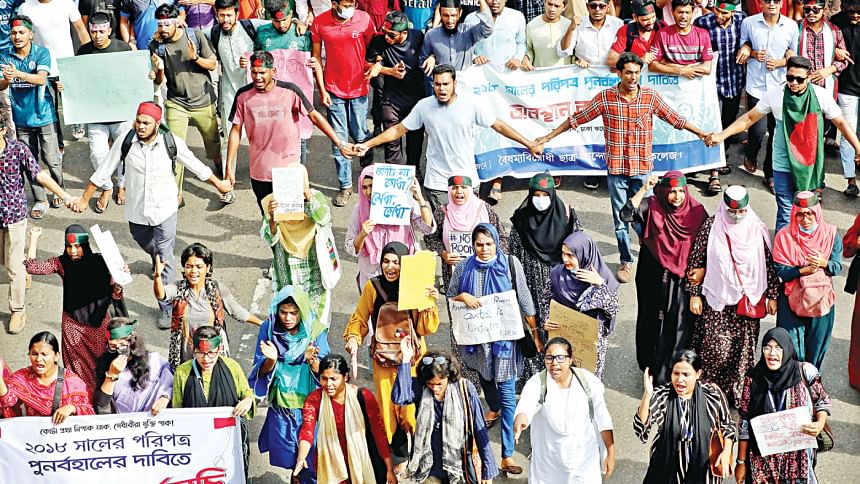
The "revolution" may have toppled a government, but for the women of the July uprising, the fight for equality, recognition, and justice is just beginning.
The Daily Star spoke to at least 20 female students who were on the frontlines of the July uprising, and the frustration in their voices was palpable.
"We, like the male students, are stakeholders in this revolution," said Faujia Nourin, a Rajshahi University student.
"But the Anti-Discrimination Students' Movement is now making political decisions without involving us. It's truly regrettable," she added.
The resentment over the lack of inclusion isn't unwarranted.
On July 8, the Anti-Discrimination Students' Movement formed a 65-member committee, of which only 16 were female coordinators or assistant coordinators.
When the platform announced its new central convening committee on October 22, it consisted solely of men -- except one woman, Umama Fatema, who was assigned the role of spokesperson.
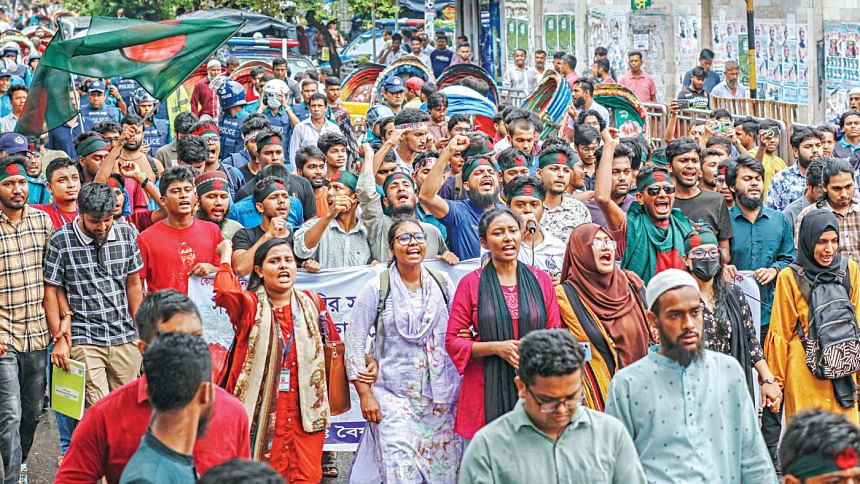
This disparity, many female activists argue, speaks volumes about the movement's prioritisation of male leadership.
For some women, this sidelining has felt deliberate. "There's been an effort to label some of the male leaders as the masterminds of this movement, while narratives about women's leadership are being downplayed," said Sayeeda Meher A Shaonlee, a student of Jahangirnagar University.
"It's as if our roles are being erased."
Shaonlee said some of the appointments are nothing more than tokenism, "showcasing" a few women to meet a quota without giving them real decision-making power.
Sanjida Dhali, a master's student from RU, expressed similar frustration.
"We were never seen as leaders. Our opinions are never taken seriously. When there's a need for female representation, they'll use us, but otherwise, we're sidelined," she said.
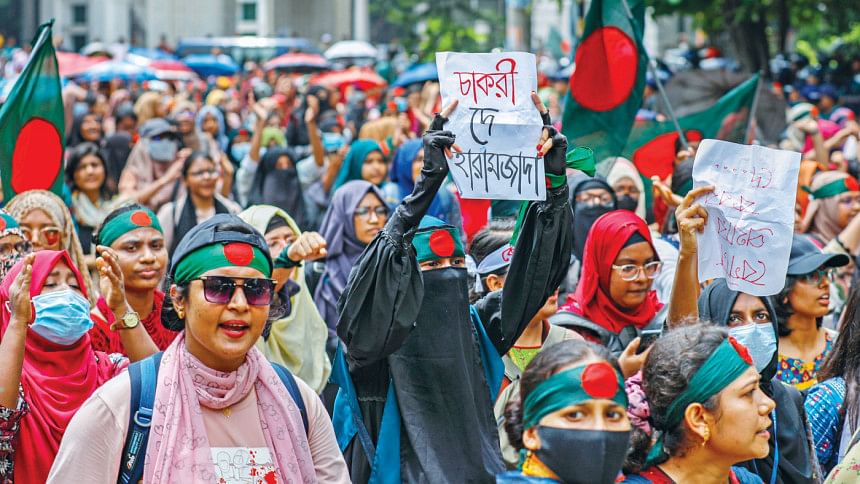
Many recalled the night of July 15, when then-PM branded the student protesters as "razakars" or traitors.
This insult ignited a wave of anger among women in Dhaka University's female dormitories, who broke through the gates and poured into the streets.
The next day, many of them were brutally attacked, harassed, and beaten by Chhatra League members, which only fueled their resolve, even as it left them scarred.
One of those women was Umama Fatema, now the spokesperson of the Anti-Discrimination Students' Movement, who played a critical role from the very beginning.
Umama's voice rang through the marches, galvanising students and giving the movement its strength. Her leadership kept the protests unified, and her courage inspired hundreds to join.
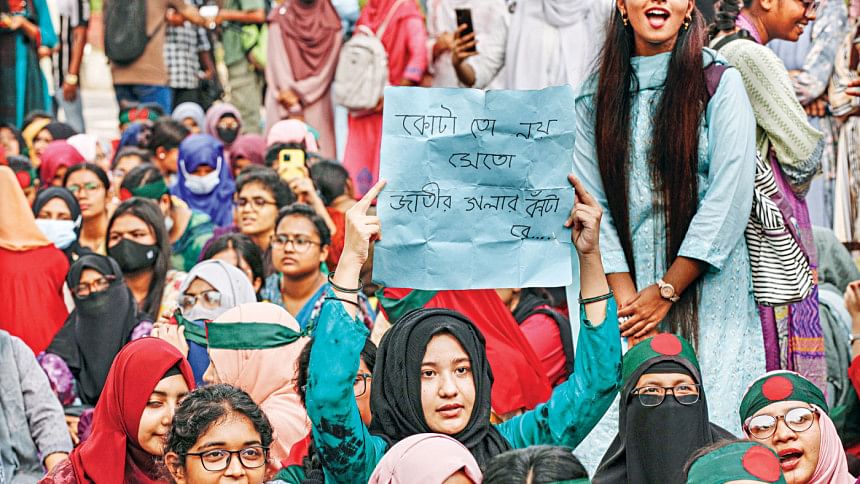
But even for her, a place at the decision-making table was hard-won.
"Every day, I face reluctance from male activists to share space," she said. "I have to fight to be in the front, whether in front of the banner or in front of the media," she added.
Shahinur Sumi, president of the Samajtantrik Chhatra Front at Eden Mohila College, highlighted the double standards that women activists face. "Women have faced resistance not only from their families but also from police, Chhatra League, and Jubo League leaders on the streets," she said.
"We were integral to this movement. We risked everything, and yet, now that the government has changed, we're left in the background."
Sumi recounts how women from all walks of life joined the movement, even those who usually remain invisible, such as sex workers.
"One sex worker risked her life to bring food to protesters. She was shot in the chest and is now hospitalised," she said.
The growing sense of exclusion among female activists is mirrored in the structure of the new interim government.
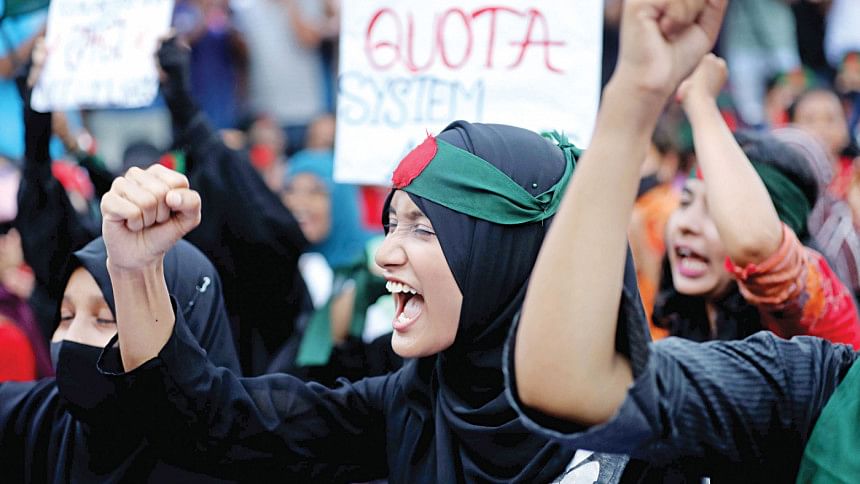
Male student leaders have quickly moved into top government positions, while the women who were their equals on the frontlines remain largely unrecognised.
Professor Tania Haque from Dhaka University's Department of Women and Gender Studies said female activists should raise their voices and demand their space.
But the reality of entrenched patriarchy makes this an uphill battle.
"Our women have the skills to lead, but without a supportive environment, they hesitate," said Farhana Binte Jigar from Jahangirnagar University.
The situation has created a disillusioning effect, pushing many women who once led rallies to the margins of activism.
The exclusion is apparent even in the remembrance of martyrs.
"We still don't have an accurate record of how many women were martyred or injured," says Tilottoma Eite, another female activist.
"The names of male martyrs are prominently displayed, but female martyrs are barely recognised."
Shahjadi Fanana Kotha of East West University highlighted how women were often excluded from post-movement decision-making.
"When we inquired about the selection criteria for leadership roles, we were told that connections matter more than contributions," she said.
The lack of recognition has led to a gradual withdrawal of women from the movement, as those who sacrificed the most find themselves pushed to the background.
Contacted, Abdul Hannan Masud, the chief organiser of the Anti-Discrimination Students' Movement, acknowledged the criticism. He said efforts are underway to increase female representation. "We aim to bring female representation up to 25-35 percent," he said.
Many women activists and student leaders said as the movement moves forward, it's clear that if female activists are not given their due respect and recognition, they risk fading from the narrative entirely.
Their contributions to the revolution are undeniable, and without them, the movement would have lacked its fervour, resilience, and humanity, they added.
They said the stories of these women are not just about gender. They are about power, sacrifice, and the relentless pursuit of equality -- a pursuit that cannot succeed if half of its warriors are left behind.
Photo: PRABIR DAS, RASHED SHUMON, PALASH KHAN
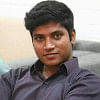
 For all latest news, follow The Daily Star's Google News channel.
For all latest news, follow The Daily Star's Google News channel. 

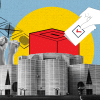



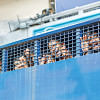


Comments